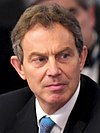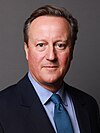The Trial of Tony Blair
| The Trial of Tony Blair | |
|---|---|
| Created by | Alistair Beaton |
| Directed by | Simon Cellan Jones |
| Starring | Robert Lindsay Phoebe Nicholls Peter Mullan Alexander Armstrong |
| Country of origin | United Kingdom |
| Original language | English |
| Production | |
| Running time | 72 minutes |
| Original release | |
| Network | More4 |
| Release | 15 January 2007 |
The Trial of Tony Blair is a
The programme is set in 2010 and stars Robert Lindsay as Tony Blair, Phoebe Nicholls as Cherie Blair, Peter Mullan as Gordon Brown and Alexander Armstrong as David Cameron.
Synopsis
A short time before the 2010 general election, Tony Blair goes on British television and gives a political broadcast, in which he announces his resignation as Prime Minister of the United Kingdom.
The
Meanwhile, Blair is having problems of his own. Both he and his wife,
To compound Blair's problems, the
The United Nations Security Council votes on the decision to bring Blair to court. Ordinarily, this would not have been an issue as the United Kingdom, a permanent member of the Security Council, would have been able to veto the resolution. Unfortunately for Blair, Brown's assistant orders the UK's Security Council representative to be absent when the resolution is voted on (as explicitly voting either way would have been damaging). The resolution passes, with all other Security Council members – including the United States – voting in favour.
Under the stress of events, Blair suffers a recurrence of heart problems, but everybody believes this is play-acting. Whilst visiting Blair in hospital, Brown informs Blair that he could not risk him touring the globe, causing further chaos. Whilst Brown states that voters want honesty rather than charisma, Blair retorts that instead they got Brown. The programme ends with Blair being flown to his trial in The Hague.
Historical changes for the programme
Several historical events have taken place before the programme begins. These include the following:
- suicide bombingsin the UK, he needed to remain in power to ensure "stability" in the country.
- Hillary Clinton has won the 2008 presidential election and is now President of the United States. To hold onto her position, she agrees to vote in favour of the UN resolution which sees Tony sent to trial.
- Secretary-General, following Kofi Annan. Like the other two points, this is more for humour than accuracy, as Annan's successor was already known to be Ban Ki-moon.
Principal characters
Whilst the programme focuses mainly on Tony Blair, people such as David Cameron, Gordon Brown, Cherie Blair and Brian Haw are regularly shown.
- David Cameron is shown as a politician believing in nothing and promoting everything – an accusation made against him by numerous newspapers in the UK.
- Gordon Brown is shown as moody and insecure. He is pressured into allowing the UN resolution to pass.
- Cherie Blair is shown, complete with her career as a leading barristerand her chambers.
- Brian Haw is a minor character, who takes to sitting outside the Blairs' home in Connaught Square, London, shouting "War Criminal" every time Tony or Cherie appear.
Although the Blairs have four children in real life, none of the children appear in the programme.
Reception
Blair was still heading the British government when the film was first broadcast. A few days later, The Economist noted that "the prime minister could not be expected to join in the general merriment" about "the eponymous villain" being charged with war crimes.[1]
See also
Notes
- ^ The Economist, Vol. 382 (2007), p. 58
External links
- Official website
- The Trial of Tony Blair at Channel4.com/More4
- The Trial of Tony Blair Review at Variety.com
- The Trial of Tony Blair at IMDb




